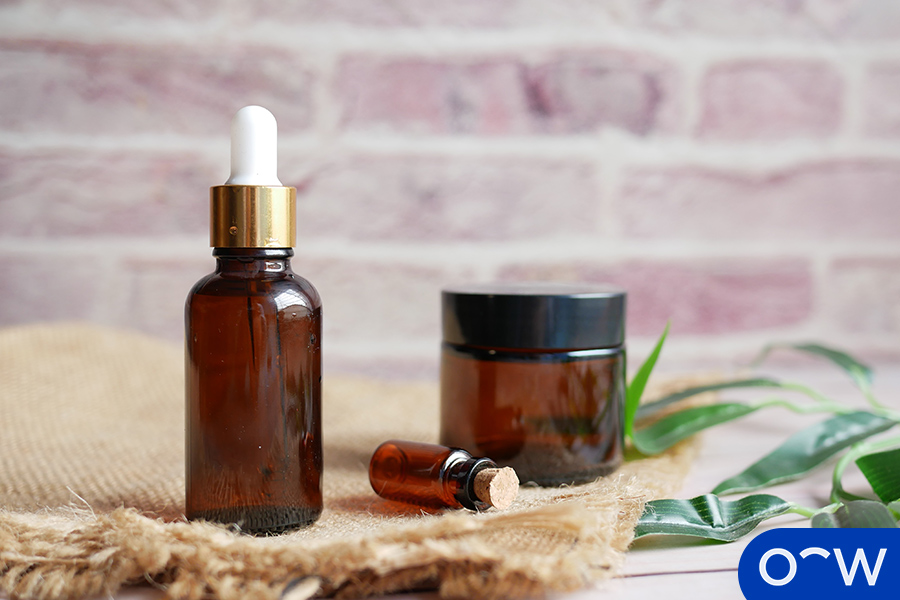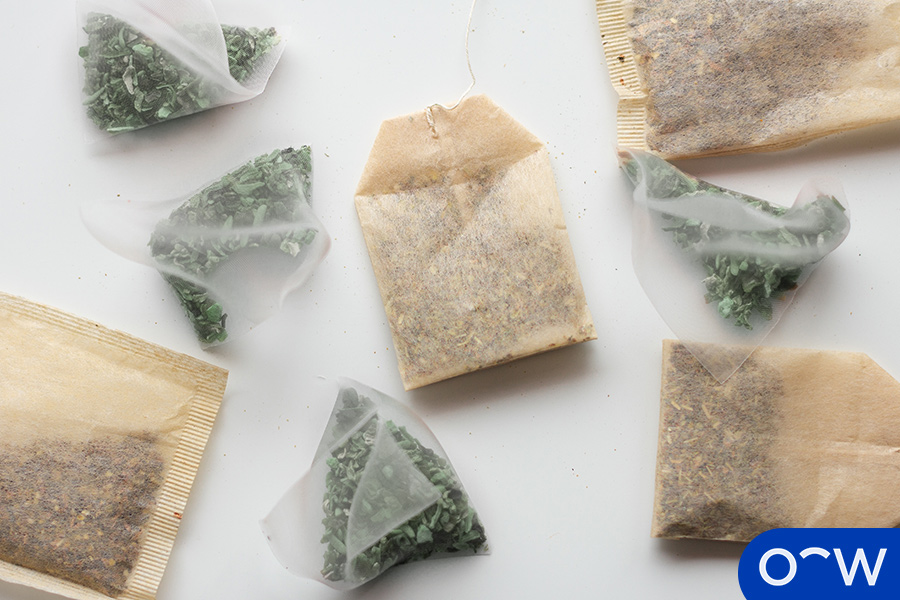14 Natural Home Treatments and Remedies for Sore Eyes
Published on March 20th, 2023
Updated on May 23rd, 2025
 Australia
Australia The 14 natural home treatments and remedies for sore eyes include Epsom salts, warm compresses and essential oils. Sore eye remedies can be defined as homemade medication and treatments prepared easily and naturally, to treat and relieve the symptoms of sore eyes. Home remedies should not be an exclusive treatment for eye conditions but they may help relieve discomfort or irritation when at home. The symptoms of sore eyes include pain, discomfort and swollen eyes. Sore eyes may be caused by allergies, conjunctivitis, dry eyes and chalazia.
It is important to consult with a healthcare professional before using any home treatments or remedies for sore eyes.
The natural remedies for sore eyes include milk and honey, potato, Epsom salt, castor oil, essential oils, coriander, cucumber, warm compress, rose water, cold compress, salt water, turmeric, guava leaves and green tea bags. The home remedies for an eye infection that may cause sore eyes, among other eye conditions that cause sore eyes, are listed below.
- Milk and honey: The soothing properties of milk and the antibacterial qualities of honey work together to help sore eyes.
- Potato: Potatoes possess properties that can be beneficial to the skin and body and may treat sore eyes.
- Epsom salt: Epsom salt is a common component of integrated medicine and can be used as a home remedy for sore eyes.
- Castor oil: Castor oil is used in eye drops to provide relief from eye irritation and can treat sore eyes.
- Essential oils: Essential oils may be used as a natural remedy for eye infections that cause sore eyes, such as conjunctivitis.
- Coriander: Coriander is an annual herb that may relieve itchy and sore eyes and is often used in traditional medicine.
- Cucumber: Cucumber is a popular ingredient used in natural home remedies and not only helps sore eyes but also irritated skin and puffy eyes.
- Warm compress: A warm compress is a simple and commonly used home remedy for many eye issues such as sore eyes.
- Rose water: Rose water is commonly used in home remedies to relieve sore or irritated eyes.
- Cold compress: A cold compress is an effective home remedy for treating sore eyes as the cold temperature can help reduce swelling and inflammation.
- Salt water: Salt water is a popular natural home remedy used to treat certain eye issues such as eye infections.
- Turmeric: Turmeric is a multifaceted herb that contains curcumin that may have medicinal properties such as antioxidant, anti-bacterial and anti-inflammatory.
- Guava leaves: Guava leaves have anti-inflammatory and antimicrobial properties that help to treat swelling, irritation and pain in the eyes.
- Green tea bags: Green tea is a caffeinated drink made from camellia sinensis leaves and its tea bags may be used to soothe sore eyes.
Home remedies should not be used in place of proper medical treatment. Consult a healthcare professional if you are experiencing eye problems.
1. Milk and Honey
Milk and honey may be used as a home remedy for sore eyes as the soothing properties of milk and the antibacterial qualities of honey work together to help treat the eyes. Itching, redness, and swelling are a few symptoms of sore eyes that milk and honey can help with because they are calming and anti-inflammatory.
It is not advised to put this home remedy directly in the eye.
2. Potato
Potatoes surprisingly possess properties that can be beneficial to the skin and body. Potatoes are rich in vitamins such as B6 and C meaning they may help to reduce inflammation to treat sore eyes and puffiness. It may also reduce dark circles under the eyes due to its calming effect.
It is not advised to put this home remedy directly in the eye.
3. Epsom Salt
Epsom salt is a common component of integrated medicine which is a type of medicine that works to treat the mind and the body at the same time. According to the Cleveland Clinic, Epsom salt is a naturally occurring mineral salt of magnesium sulphate.
To use Epsom salt as a home remedy for sore eyes, mix Epsom salt in hot water until it dissolves. Soak up the solution with a cotton pad and place it over the closed eyes for 5-10 minutes. After the treatment, rinse the eye out with water.
4. Castor Oil
Castor oil is often used in eye drops to provide relief from eye irritation. Castor oil is derived from castor beans and is used in pharmaceuticals and medicine. It is a naturopathic method used to treat many different conditions including sore eyes.
It is not advised to put this home remedy directly in the eye.
5. Essential Oils
Essential oils should not be used or applied anywhere near the eyes. To use essential oils as a sore eyes remedy, you will need to use them in a diffuser which will be distributed via water vapour. Essential oils are commonly used in natural remedies due to their medicinal properties and are made by extracting the natural chemicals that come from certain plants such as lavender, rose and tea trees.


6. Coriander
Coriander is an annual herb that may relieve itchy and sore eyes and it is often used in traditional medicine. Coriander contains anti-inflammatory and anti-bacterial properties used to help soothe sore eyes.
It is not advised to put this home remedy directly in the eye.
7. Cucumber
Cucumber is a popular ingredient used in natural home remedies and skin care products to not only help sore eyes but also irritated skin and puffy eyes. Cucumber is used for its cooling effects, hydration and anti-inflammatory properties due to the vitamin C.
Use slices of cucumber soaked in cold water for the ultimate cooling effect and place over closed eyes for 5-10 minutes. The juice of a cucumber can also be used to treat sore eyes and may soothe puffy eyes and lighten dark circles. Repeat this cucumber home remedy when the eyes feel in need of cooling relief.
8. Warm Compress
A warm compress is a simple and commonly used home remedy for many eye issues. It can be effective for treating sore eyes as the heat from the compress helps to increase blood flow to the area, reducing inflammation and relieving discomfort.
A warm compress is made up of warm water and a washer or cloth. Simply take a clean cloth and soak it in warm, not hot, water, wring out any excess water then gently place it over closed eyes and leave it for 2-5 minutes. This can be repeated several times throughout the day to soothe the eyes.
9. Rose Water
Rose water is commonly used in home remedies to relieve sore or irritated eyes. Rose water is made with rose petals steeped in distilled water and may have benefits such as soothing irritated skin, reducing inflammation and calming redness.
It is not advised to put this home remedy directly in the eye.
10. Cold Compress
A cold compress is an effective home remedy for treating sore eyes as the cold temperature of the compress can help reduce swelling and inflammation, numb the area, and relieve discomfort.
A cold compress is comprised of cold water and a washer or cloth. Simply take a clean cloth and soak it in cold water, wring out excess water then gently place it over the closed eyes and leave for 2-5 minutes. This can be repeated several times throughout the day to soothe the eyes.
11. Salt Water
Salt water is a popular home and natural remedy used to treat certain eye issues such as eye infections. It works by clearing away eye irritants such as dirt or pus, functioning like tears in the eyes. Salt water is full of minerals such as iron and zinc which are beneficial for the skin as it helps with inflammation and has healing properties.
Salt water can be made at home using cooled boiled water and salt. Mixed together, this natural remedy can be wiped across the eyelids using a cotton pad. Repeat this process a few times a day to soothe eye irritation.
12. Turmeric
Turmeric is a multifaceted herb that contains curcumin that may have medicinal properties such as antioxidant, anti-bacterial and anti-inflammatory. Turmeric is known to have many health benefits and turmeric may help treat sore and irritated eyes.
It is not advised to put this home remedy directly in the eye.
13. Guava Leaves
Guava leaves have anti-inflammatory and antimicrobial properties that help to treat swelling, irritation and pain in the eyes. Guava leaves are members of the Myrtle family and are available all year round. They have been used in natural medicine for relief from menstruation symptoms and may help boost immunity.
It is not advised to put this home remedy directly in the eye.
14. Green Tea Bags
Green tea is a caffeinated drink made from camellia sinensis leaves and its tea bags may be used to soothe sore eyes. The caffeine in green tea helps to treat minor swollen and puffy eyes as it restricts the blood vessels.
It is not advised to put this home remedy directly in the eye.


What are Sore Eyes?
Sore eyes is a term used to describe a condition or symptom where the eyes are irritated or mildly painful and can occur due to many different factors. Sore eyes is also known as eye pain and may be due to inflammation or infection. The conditions that may cause sore eyes include conjunctivitis and blepharitis. Symptoms of sore eyes include blurred vision, dry eyes, eye pain, and watery or tearing eyes. Other than home remedies, sore eyes are treated by a health care professional depending on the cause.
It is important to consult with a healthcare professional if you have sore eyes and before using any home treatments for this condition.
What is the Fastest Way to Cure Sore Eyes?
There is no one way that will cure sore eyes faster than another, as each experience of sore eyes will likely differ. What is fast for some people, such as cold compresses, may not work as quickly for other people.
What do Sore Eyes Feel Like?
Sore eyes can feel different for different people, depending on the cause. Some people might find sore eyes to feel like a stinging sensation. Others may feel itchy or pain, or feel like there is a foreign body in the eye.
Are There Over-the-Counter Medicines for Sore Eyes?
Yes, there are over-the-counter medicines available for sore eyes, including eye drops or antihistamines. It is always best to consult with a doctor or pharmacist before taking any over-the-counter medication, as it may not be suitable for everyone. If sore eyes have been caused by allergic reactions, eye drops or antihistamines may be used to help manage this reaction and soothe sore eyes. Other eye drops, such as antibiotics for sore eyes caused by infections, will be prescription only.
When Should You Seek Professional Help for Sore Eyes?
It is important to seek professional help for sore eyes as soon as symptoms arise. Whilst some cases of sore eyes may be able to be treated with more conservative methods such as home remedies, it’s important to understand why the eyes are sore before moving onto treatment. If sore eyes are being caused by an infection, for example, it is important to see your health care provider, as conservative, home remedies will not get rid of this issue and antibiotics may be needed as treatment.
What are the Causes of Sore Eyes?
There is a wide range of causes of sore eyes ranging from relatively harmless to more serious. Some of the common eye conditions that may cause sore eyes include conjunctivitis, a stye, dry eyes, keratitis and blepharitis. Other causes include excessive eye rubbing, wearing glasses with an incorrect prescription and being hit in the eye.
How Do Sore Eyes Spread?
Sore eyes may or may not spread, depending on what is causing the sore eyes. Sore eyes caused by viral or bacterial conjunctivitis for example is highly contagious and can be spread through direct contact with an infected person such as touching or through airborne droplets in the respiratory tract. A person can prevent conjunctivitis from spreading by practising good hygiene, washing their hands often, not touching their inflamed eyes and avoiding sharing personal items such as towels, cups, makeup, or contact lenses. Sore eyes from wearing glasses with an incorrect prescription however, will not spread.
What are the Tips to Prevent Sore Eyes?
Tips for preventing sore eyes change depending on the cause of this eye condition. Sore eyes caused by eye strain and fatigue may be prevented by taking regular breaks to let the eyes rest. If it is caused by a stye, practising good facial hygiene may prevent the infection from forming.
How to get rid of an eye infection?
Eye infections such as conjunctivitis, corneal ulcers and blepharitis may be treated with antibiotics and eye drops.
Can Wearing Eyeglasses Prevent Sore Eyes?
Yes. If sore eyes are caused by eye strain, eyeglasses can help to prevent discomfort by correcting a person’s vision.
Blue light glasses may also prevent sore eyes as they help block rays that could potentially cause discomfort and strain to your eyes. Oscar Wylee offer’s blue light filter for an additional $80 on a standard pair of prescription glasses.


Are Home Remedies Effective Treatment for Sore Eyes?
Yes and no. In some cases, home remedies can be effective at treating sore eyes but in more serious and persistent cases, you should seek diagnosis and treatment for an eye care professional. Home remedies can be a way to deal with discomfort from sore eyes by using natural treatments but should not be the only treatment.
Does Having Sore Eyes Mean You Need Glasses?
Not necessarily, sore eyes may be caused by eye strain due to an uncorrected refractive error such as myopia or hyperopia. Prescription glasses can be used to treat this specific condition. Common symptoms that indicate you may need glasses include blurry vision and trouble with near tasks such as reading or writing.
Can Eye Drops Reduce Sore Eyes?
Yes, certain types of eye drops can reduce sore eyes depending on the cause of the sore eyes. Lubricating eye drops may provide relief for people with sore eyes especially if the discomfort is caused by allergies, inflammation or crying. According to the American Academy of Ophthalmology, lubricating eye drops are also known as artificial tears moisturise the eyes by adding elements to the eyes that exist in tears.
Can You Cure a Sore Eye with Ice or Heat?
You will not be able to treat or cure a sore eye with ice or heat, in the same way you may use these things to help treat an injury to other parts of the body. A person may use warm or cold compresses, however, to help soothe sore eyes.
What are the Types of Sore Eyes?
There are no particular types of sore eyes, but different types of conditions may cause sore eyes. The types of conditions that may cause sore eyes include allergies, conjunctivitis, blepharitis, stye and sinusitis. The types of conditions that may cause sore eyes are listed below.
- Allergies: Allergies occur when a person’s immune system responds to substances that are not generally harmful to other people. Allergies can cause the eyes to become inflamed, itchy or sore in response to this immune system response.
- Conjunctivitis: Conjunctivitis is an inflammation of the conjunctiva, or the white part of your eye. Conjunctivitis can cause swelling, itchiness and pain in the eye, which may lead to soreness.
- Blepharitis: Blepharitis refers to inflammation of the eyelid. This inflammation may cause the eyes to feel sore.
- Stye: A stye refers to a lump on the eyelid, often caused by an inflamed or infected oil gland. Styes are red and swollen and can lead to sore eyes.
- Sinusitis: Sinusitis refers to the inflammation of the tissues in the sinuses. Sinusitis can cause sore eyes as the sinuses are around the eye area, and inflammation may cause pressure or pain.
Should You Wear Sunglasses for Sore Eyes?
If sore eyes are accompanied by light sensitivity, then wearing sunglasses may be helpful. Light sensitivity refers to the eyes becoming overly sensitive to light, like the sun. Conditions such as conjunctivitis or blepharitis may cause increased light sensitivity. If the eyes are feeling sensitive to light, then sunglasses when outside may help. It is important to seek medical attention for light sensitivity, as this can be a symptom of a more serious issue.
Read Corneal Disease: Types, Symptoms, Causes, and Treatment in other Oscar Wylee regions and their languages.
 Australia
Australia




